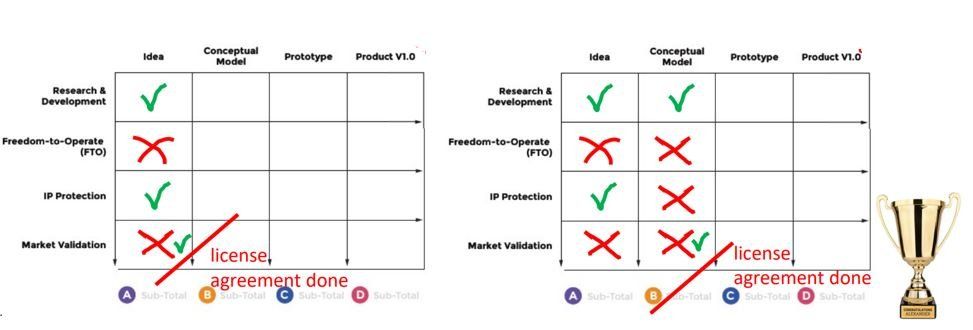This is where I am coming from: I have just seen one of Stephen Key's videos on LinkedIn, and I believe that this video is so fundamental for the work of a patent attorney that you must see it if you are one.
My long-time measurement result about creativity is this: 60% of the people, from garbage collector over train conductor and patent attorney to university professor, have zero (0) creativity. And you cannot do much about it. And the other 40% seem to be born with it. You can factually see it in their lives, often almost immediately after being born but at the latest in primary school.
And this is my long-time insight as a patent attorney: sole inventors are the most endangered species in this world because their creativity often destroys their lives. They often spend their savings and sell important assets, like their homes and their mothers' homes, to fund their ideas. However, these ideas do not (always) make money.
What is Licensing and What is Venturing
Stephen Key's video speech focuses on comparing and contrasting two business approaches: licensing and venturing, particularly in the context of product development and marketing. He opens the speech by posing a common question that he encounters: whether to manufacture and sell a product independently, in other words "venturing", or simply to license it to another company.
I have earlier written about Stephen Key and his preferred Innovation Strategy: he is clearly favoring the licensing approach, and I agree with him that this is the preferred solution for sole inventors. In the 4×4 Innovation Strategy matrix, it is either one of the two following strategies:

Please check out my little screencast video about different Innovation Strategies here: ip-lawyer-tools.com/lesson/the-4×4-innovation-strategy-roadshow/ and you can also download my "4×4 Innovation Strategy" book for free, here: ip-lawyer-tools.com/the-4×4-innovation-strategy/.
In very short words, Keys Innovation strategy is focused on market validation from the moment after the inventor has conceived his idea. He recommends to put as little as possible energy into R&D for demonstrating that the inventor's idea works in order to minimize risk. He never speaks about Freedom-to-Operate (FTO), and he recommends saving on IP. He has even written a book "Sell Your Ideas With or Without A Patent". If I could lodge one single complaint with Stephen then this would be that he never says in the open that his IP/Patent Strategy only works with the USA, and not outside. I have met inventors outside of the USA that were applying his ideas about patenting and – by doing so – they were about to shoot themselves in the foot. But that is probably how things work: US people think that everything on earth is like it is in the US, or – if it is not – at least it should be so.
Apart from this, I highly recommend Stephen Key's books and his other teaching materials.
Securing a Deal Without a Patent
Key's video begins by explaining product licensing, his preferred method due to its low risk and no requirement for personal involvement in manufacturing, distribution, or sales. He gives an example of a product he licensed, "spin cups", discussing the process of creating a prototype, reaching out to a company (Trudeau in Canada), and securing a deal without a patent.
And Key rightly emphasizes the appeal of licensing: no financial risk and leveraging another company's existing distribution and sales networks.
Setting up a Company for Making an Idea Life
After this short introduction, Key shifts to discuss venturing, sharing his experience with guitar picks. He highlights the need for understanding the industry, partnering with knowledgeable people, and having a clear game plan. Key points out the high costs and time investment required in venturing, along with the necessity of understanding manufacturing processes and creating demand. He stresses that success in venturing is achievable but requires significant effort, time, and financial investment.
And that comes with a risk to get killed along the way, especially in times of high interest rates as today.
Comparing Profit Margins, Stress and Personal Preference
Key compares the financial aspects of licensing and venturing. He notes that licensing offers a lower percentage (5-7%) but involves no risk, while venturing can yield higher returns (around 30%) but requires significant effort and investment.
He discusses the stress involved in running a business, using his guitar pick venture as an example. And he concludes that, despite the potential for higher profits in venturing, he prefers licensing due to its lower stress and risk levels.
You are now ready to watch his video:
If the video is no longer there, you can watch it here: Stephen Key about Venturing
Conclusion
These are the take-away points of his short video:
- Licensing: Lower risk, no need for personal involvement in manufacturing or sales, but lower profit margins.
- Venturing: Potentially higher profits but requires significant investment, effort, and industry knowledge.
- Personal Preference: Key prefers licensing due to its lower stress and risk, despite the potentially higher profits of venturing.
Stephen Key's video provides a clear and detailed comparison between two common approaches in product development, drawing from Key's personal experiences to highlight the practical implications of each choice.
Stephen Key aims to help these sole inventors. He wants to stop them from making mistakes. Highly recommended.
Send your sole inventors to him and save their lives!
The content of this article is intended to provide a general guide to the subject matter. Specialist advice should be sought about your specific circumstances.
We operate a free-to-view policy, asking only that you register in order to read all of our content. Please login or register to view the rest of this article.

